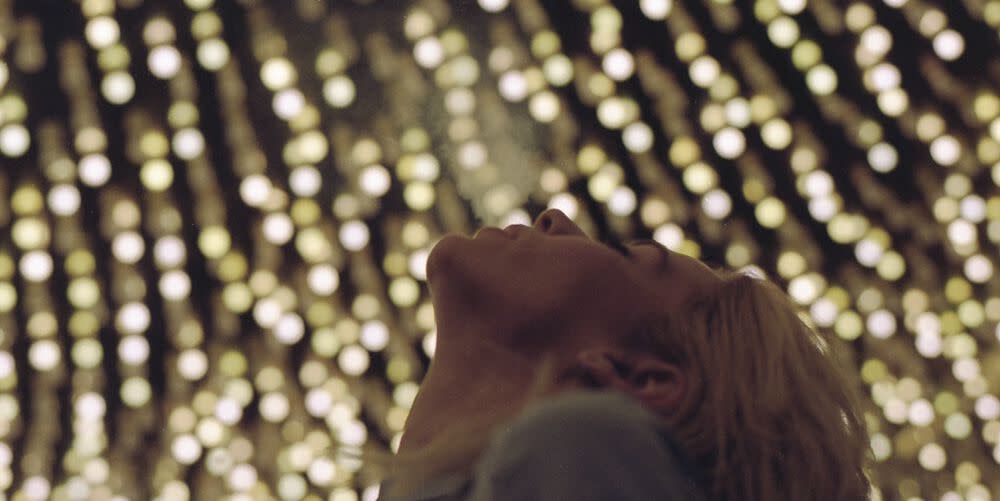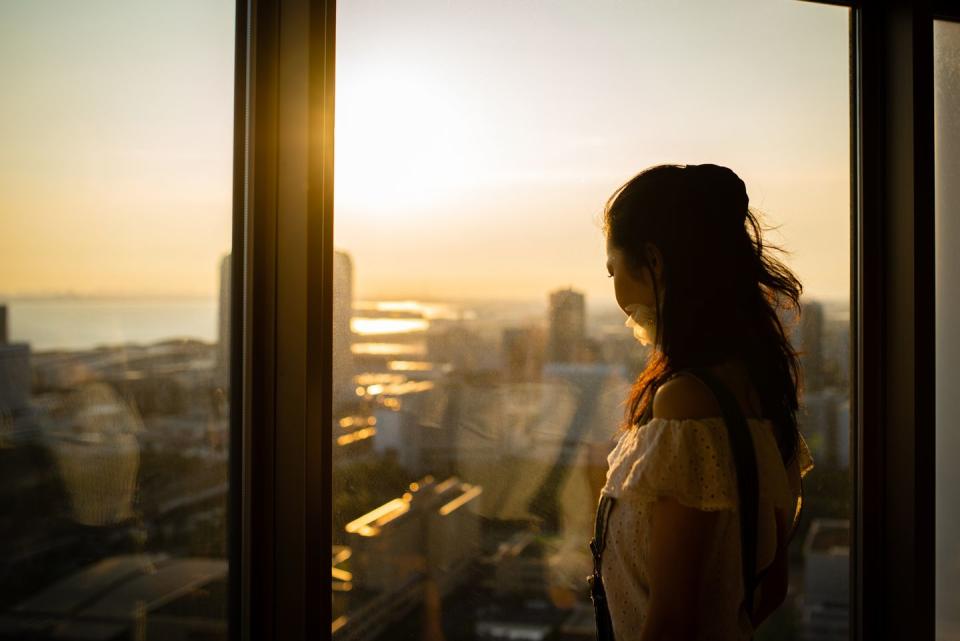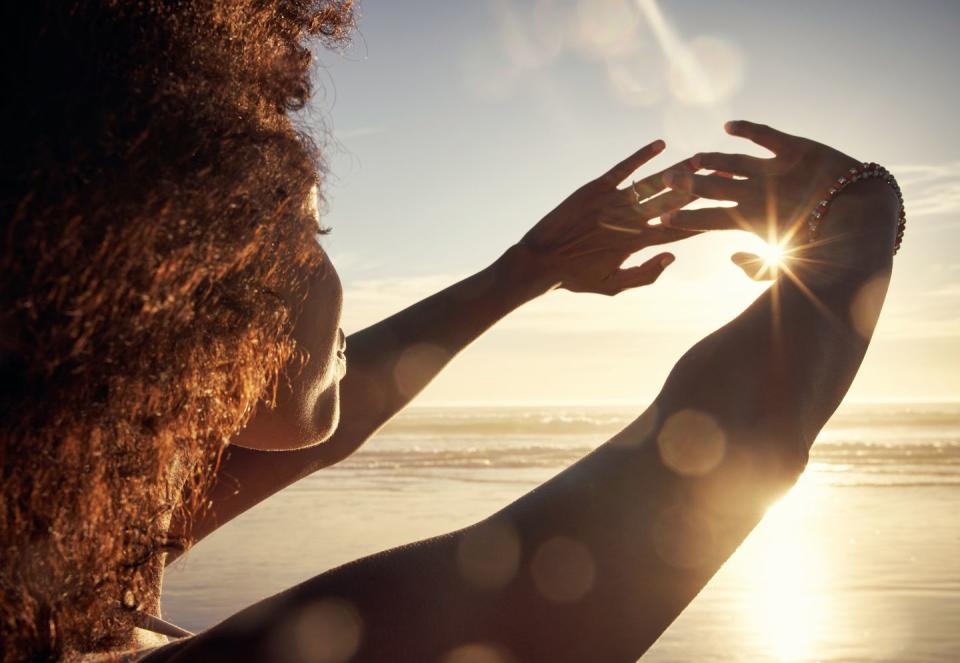What Happens When You Try And Escape Yourself

'I can be at your place in 20 minutes,' said the message on my phone. My pulse raced at the sight of it. Around me, the 30 or so strangers I sat among were saying the serenity prayer in unison, but that night I wasn’t interested in serenity.
Instead, I was lost to the possibilities suggested by that text. It was from a man with a luxuriant moustache I’d been talking to online – he wore loud shirts and had an eccentric way with capital letters that made me think he’d be a good distraction. And I wanted to be distracted: I was newly sober and itching for another way to get out of my head.
I’d been going to AA meetings for a few months by then and was starting to get used to the rhythm of them. You listened to someone describe their drinking, how they quit, and what their life was like now that they were sober. Invariably, it seemed to involve long walks in nature and swimming in the sea. People who went on about the healing properties of exercise always made me suspicious, but whenever I sat in those church basements I tried my best to listen because I wanted to feel better than I did.
The rooms were full of people who had been able to make a seemingly impossible change, and their mostly calm demeanours and the healthy glow of their skin suggested they were doing something right. They seemed to have it together, whereas I was definitely falling apart. They talked of surrender and finding peace, which to me felt out of reach. Peace of mind was all well and good, but my mind was a viper’s nest of critical thoughts constantly writhing for my attention. I was much more interested in escaping it.

People talk about ‘being present’ as if it’s a simple thing to do, but when the inside of your head is a hostile environment it is excruciatingly hard to actually be where you are. If you live with anxiety or depression, to be in the moment means facing the slings and arrows thrown by an inner voice hell-bent on dragging you down.
My solution was to become an escapist, an expert at giving reality the slip. It started when I was very young. Early school report cards lamented my tendency to daydream – the classic ‘Octavia shows great potential if only she’d apply herself’. But I found the mundanity of the real world dull, and instead sought refuge in an imagination fuelled by books and art and the stories told to me by the adults in my life.
For as long as I can remember, I have preferred the intensity of experiences considered worth writing about – great loves, dangerous adventures, big ideas – to the monotony of my negative thoughts, critical and bullying, a relentless commentary on whatever I thought or did. I can’t say when they started but I don’t recall a time without them. There was no singular trauma that set things off, but I was a sensitive child, thin-skinned, and absorbed the world around me without a filter. It often felt as if my mind was determined to self-sabotage. The predictable beats of daily life offered no protection, so I sought out experiences or feelings I could get lost in.
Then, in my early teens, I discovered drinking. It was a failsafe shortcut out of myself. The way the first glass silenced any self-consciousness or doubt. The way the second dissolved the edges of things, and filled me with a sense of tremendous wellbeing. The way the third made my head spin on the last Tube home.
As I got older, drinking wasn't my only escape route, but it was folded into everything else that followed. I learned I could disappear into other things, too: new friendships, new cities, new lovers, new things. Newness in general. New languages were portals to whole other worlds and tantalising new identities. At university I studied Spanish and enjoyed the different version of myself I became when I spoke it – throaty and confident, like a character in an Almodóvar film.
After I graduated, I got a university job in Paris and chased the illusion of Gallic insouciance. (Now I can admit it never quite fitted, no matter how many Gauloises I smoked.) At first, I loved the city so much I thought I had pulled off an impossible trick: I’d done it! I had escaped! But it didn’t take long for the writhing thoughts to catch up with me, and after a year they were as noisy as they’d ever been. I realised that to outrun them I had to escape Paris, too.
Meanwhile the consequences of my drunken escapades got more extreme. They went from hangovers and bruised knees or the occasional failure to show up for a friend to dangerous encounters and accidents that needed treatment by doctors. I spiralled away from my family and closest friends towards people I barely knew, people who were escapists like me. You know the type: the ones who never want to go home at the end of the night, for whom the returning daylight is simply the signal to go round again. My grip on reality grew less and less firm and eventually, when I was almost 27, I’d unravelled enough for a psychiatrist to get involved.
After I had a motorbike accident, he suggested I go to AA – to him, it no longer looked like escape I was chasing, but oblivion. The thing is, sometimes oblivion feels good. There’s a reason it’s the name of a rollercoaster – there can be a deep pleasure in letting go. There is something gratifying in self-abandon and the adrenaline rush of risk. And there’s nothing wrong with chasing a little oblivion from time to time. The trouble comes when it goes from being the exception to the rule.
Only a few weeks into that first summer of my newly sober life, I went with a close friend to Stromboli, an Italian island paradise that’s also an active volcano. The clear, blue water and black volcanic sand were beautiful and transporting, but what really did the trick was the volcano itself. The vast, heavy mass of it rumbling away, puffing out plumes of grey smoke and, at night, orange sparks of lava. I knew if it erupted we’d never get out alive, which thrilled me. There were no cars on the island, barely any phone reception, and at least as many cats as there were people. Each day I ate the capers that grew there and swam in the sea and wished I could stay forever. Though by then I knew that, eventually, even a volcano would stop being enough.
Back in London there was nothing so elemental to buffer me from the daily grind, but I found other ways to avoid it. I ended up with a wardrobe full of clothes I didn’t actually wear, each item bought in the hope it would work like Dorothy’s glittering red shoes and whisk me away to Oz: second-hand cocktail dresses and sequined high heels, clothes for a life of glamour I wasn’t really living – at the time I was working on my doctorate, and spent most days in the library wearing jeans and Doc Martens.
Then there was the man and his moustache. That evening at the meeting, my body was there in that east-London crypt, feet firmly on the flecked grey lino, but my mind was already with him. Or, more truthfully, with the version of him I’d created from the messages we’d pinged back and forth. When the person next to me started warning about the dangers of dating in early recovery, instead of listening I slipped out early and texted moustache man my address.
‘See you soon,’ he replied. Tinder had recently launched and it landed in my life like a portable trapdoor that fitted in my pocket. Not quite a volcano, but what is a dating app if not an engine for escape? A story-telling machine. ‘That guy’s coming round,’ I texted a friend who lived nearby. ‘Hopefully not a politician or a murderer, but if I don’t answer tomorrow, send in the dogs.’ I had just enough time to change into a vampish sheer dress before I heard him ring the bell. I took a deep breath, and opened the door.
The trouble with escape routes is that, when it’s yourself you’re running from, eventually they stop working. It turns out you are a shadow it’s impossible to shake. The man with the moustache was ultimately a disappointment. Not as big a distraction as I needed him to be. The same went for the others that followed. I didn’t understand it then, but at the time I was more interested in intensity than intimacy, which meant I went at everything full throttle, thirsty for a transcendence it was impossible for another person to provide. It wasn’t their fault. The truth is that it wasn’t really about them at all.
Not long after that I stopped dating for a while. I followed the principles I was taught in recovery meetings, which meant learning to sit with my feelings instead of trying to outrun them – whether into people, places or things. At first it was horrible, but slowly I got better at it. Still, it took a few more years of sobriety and plenty of trial and error before I finally understood the meaning of serenity.
It happened, I’m afraid to say, on a long walk that also involved swimming in the sea. I was four years sober when I finally decided to give the nature thing a try. I’d just submitted my PhD thesis and wanted to clear my head, so I took myself down to Cornwall for a few days. There, I planned to strike out on the South West Coast Path and walk as far as I could.

Once I’d arrived, I threw some things in an old backpack and got straight out on the footpath. My steps fell into a gentle rhythm as my eyes and ears tuned in to my surroundings: magenta foxgloves and the bees that buzzed between their flowers, the predictable lap of the waves. I was astonished by the way the first hour silenced any self-consciousness or doubt. The way the second dissolved the edges of things, and filled me with a sense of tremendous wellbeing. The way the third made my head spin with the beauty of it all.
Flanked by the hedgerows and the sea, I felt at one with the steady movement of my body and, to my surprise, something clicked. Finally I could see that, in all the ways I’d tried to escape myself before, what I’d chased was the feeling of being out of control. I’d wanted to give myself over to something not in my hands – the risk of the unknown, whether a new person or a new experience.
But now it was starting to sink in that, ultimately, if you’re always on the run from reality, you end up absent from your own life. There on the path, it was simple: I didn’t need a volcano, or a man from the internet, or a pair of red sequined shoes. I was content to be there and nowhere else. This was what I’d heard so many people in the meetings describe over the years. The knowledge that it was possible to be at home inside my own mind, not to need to escape it at all. This was peace. It may sound like a small thing, but it was a revelation, and proof that all the work I’d put into my recovery was worth it. But everyone feels better on holiday, and I wasn’t sure peace was something I’d be able to hold on to when I returned to the city and the pressure of my real-life obligations.
There have certainly been times when I couldn’t. But on that walk, something profound shifted. As though, after years of scratching away at it, I finally unlocked the door to a secret internal room that I could access whenever I need to feel the ground beneath my feet. Now, almost 10 years since I stopped drinking, I still like to escape from time to time – into a new place, good music or a great story – but I don’t feel as if I need to in order to survive, and I always want to come back.
When life is challenging and peace feels harder to come by, I remember that the path towards it doesn’t lie outside my mind, but within it. I remember those days spent walking between the hedgerows and the sea, and that reality is not such a terrible place to be.
'This Ragged Grace' by Octavia Bright will be published on June 1, 2023.
This feature originally appeared in the June 2023 issue of ELLE UK.
You Might Also Like


